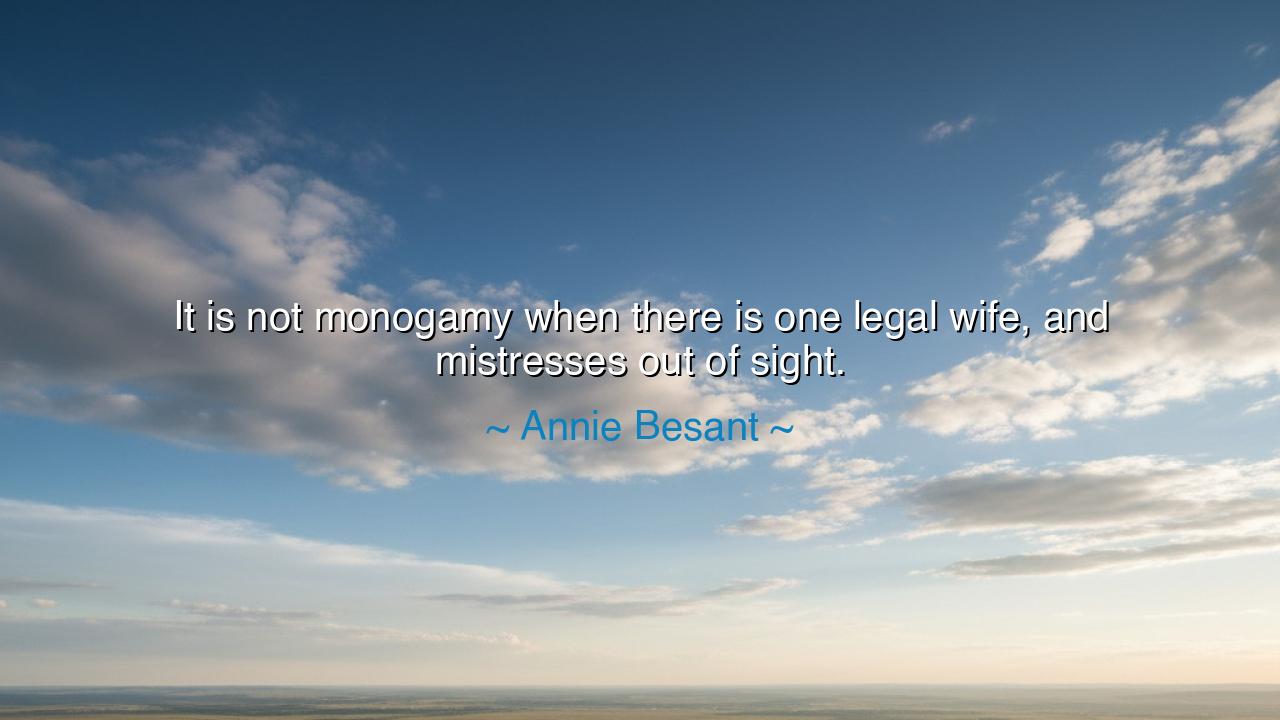
It is not monogamy when there is one legal wife, and mistresses






Hearken, O seekers of truth, to the words of Annie Besant, a woman of fierce intellect and burning moral courage, who declared: *“It is not monogamy when there is one legal wife, and *mistresses out of sight.” In this single sentence she strikes at the heart of hypocrisy, unmasking the false virtue that cloaks itself in legality while concealing deceit. Her words are not merely about marriage—they are about integrity, about the unity between what is proclaimed and what is practiced, between the outer law and the inner truth.
Monogamy, in its truest form, is not a contract written by law but a covenant sealed by honesty. Besant, who lived in the tumultuous late 19th and early 20th centuries, was no stranger to the conflicts between moral appearance and genuine virtue. In her time, Victorian society praised chastity, honor, and domestic purity, yet beneath its polished veneer thrived double standards—men celebrated for their libertinism, women condemned for lesser transgressions. Thus, when Besant speaks, she tears the veil from this hypocrisy, reminding her listeners that fidelity is not a matter of public ceremony, but of private conscience.
Consider her phrase “one legal wife.” Here, the word legal is an indictment, not a shield. The law, she implies, can sanctify only form, not sincerity. A man may obey the law’s demand—marrying in church, signing the register—yet violate the moral essence of that union by deceit. For mistresses out of sight are not merely secret partners; they are the shadows of untruth, the unspoken betrayals that render all vows hollow. The ancients, too, understood this—Socrates once said that a man’s virtue is revealed not in how he appears to others, but in how he conducts himself when unseen.
The story of King David stands as a timeless example of the struggle between moral pretense and private weakness. Though chosen by God, though anointed ruler of Israel, David’s heart wavered when he saw Bathsheba, another man’s wife. His attempt to conceal his sin led to tragedy, deceit, and the death of the innocent. David’s repentance was long and bitter, and through it he learned the truth that Besant later voiced: righteousness cannot coexist with hidden betrayal. To be faithful in name but false in spirit is to stand condemned by one’s own conscience.
Besant’s rebuke reaches beyond marriage into every realm of human endeavor. A nation that preaches justice yet hides corruption, a priest who teaches virtue yet commits cruelty, a friend who speaks loyalty yet whispers deceit—all are guilty of the same duplicity she condemns. The law may not punish them, but the moral order of the universe, which sees into hearts, cannot be deceived. The strength of society, like the sanctity of marriage, depends not upon what is written on paper but upon what is lived in truth.
From this reflection arises a lesson both timeless and personal: let your public vows mirror your private actions. The essence of monogamy—and indeed, of integrity itself—is wholeness. To love one person is to be one within yourself; to deceive is to fracture that wholeness, to live divided in spirit. The mistress out of sight is not only the other woman—it is the hidden lie, the compromise of the soul.
O children of light, take heed of Besant’s wisdom. Do not hide dishonor behind legality, nor justify betrayal with ritual. Whether in love, in friendship, or in faith, let your word be pure, your conduct transparent, your heart undivided. For the truest fidelity is not demanded by law—it is chosen by the spirit. And where honesty dwells, even silence becomes sacred, for the one who is whole in heart can stand before the world—and before the divine—without fear or shame.






AAdministratorAdministrator
Welcome, honored guests. Please leave a comment, we will respond soon